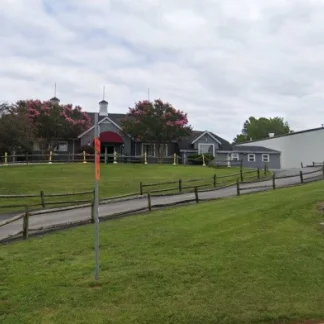Salem VA Medical Center - Lynchburg CBOC
Lynchburg VA Community Based Outpatient Clinic is located in Lynchburg, Virginia...
Located in Lynchburg, Virginia, Lynchburg Comprehensive Treatment Center is a leading provider of medication assisted treatment for individuals who are battling an addiction to opioids. Lynchburg Comprehensive Treatment Center provides all-encompassing care that includes a combination of therapeutic interventions along with the implementation of safe and effective medications.
Contact us for more information: (434) 439-3283

Connect with Lynchburg Comprehensive Treatment Center by calling their admissions team directly.
(434) 439-3283 Website Get DirectionsThe Commission on Accreditation of Rehabilitation Facilities (CARF) is a non-profit organization that specifically accredits rehab organizations. Founded in 1966, CARF's, mission is to help service providers like rehab facilities maintain high standards of care.
CARF Accreditation: Yes
The Joint Commission, formerly known as JCAHO, is a nonprofit organization that accredits rehab organizations and programs. Founded in 1951, the Joint Commision's mission is to improve the quality of patient care and demonstrating the quality of patient care.
Joint Commission Accreditation: Yes
Research clearly demonstrates that recovery is far more successful and sustainable when loved ones like family members participate in rehab and substance abuse treatment. Genetic factors may be at play when it comes to drug and alcohol addiction, as well as mental health issues. Family dynamics often play a critical role in addiction triggers, and if properly educated, family members can be a strong source of support when it comes to rehabilitation.
Just like individual therapy, the purpose of group therapy is to productively understand the influences that may have contributed to an individual’s addiction in the first place. Group therapy allows individuals struggling with addiction a safe environment in which they can openly discuss these external stressors amongst other individuals who understand the struggles of addiction.
Individual therapy, which is treatment that requires meeting with a counselor on a regular basis, is often highly beneficial for someone who is striving to recover from an addiction to substances, such as prescription pills or heroin. Through individual therapy, a person can make sense of his or her emotions, behaviors, and decision-making skills that contributed to the addiction. As a result, a person often learns from this understanding in ways that help build a healthy and happy recovery.
Just like individual therapy, the purpose of group therapy is to productively understand the influences that may have contributed to an individual’s addiction in the first place. Group therapy allows individuals struggling with addiction a safe environment in which they can openly discuss these external stressors amongst other individuals who understand the struggles of addiction.
Individual therapy, which is treatment that requires meeting with a counselor on a regular basis, is often highly beneficial for someone who is striving to recover from an addiction to substances, such as prescription pills or heroin. Through individual therapy, a person can make sense of his or her emotions, behaviors, and decision-making skills that contributed to the addiction. As a result, a person often learns from this understanding in ways that help build a healthy and happy recovery.
Individual therapy, which is treatment that requires meeting with a counselor on a regular basis, is often highly beneficial for someone who is striving to recover from an addiction to substances, such as prescription pills or heroin. Through individual therapy, a person can make sense of his or her emotions, behaviors, and decision-making skills that contributed to the addiction. As a result, a person often learns from this understanding in ways that help build a healthy and happy recovery.
Lynchburg VA Community Based Outpatient Clinic is located in Lynchburg, Virginia...
Child and Family Services is a private rehab located in Forest, Virginia. Child ...
Horizon Wellness Center - Court Street is located in Lynchburg, Virginia. Horizo...
Horizon Therapeutic Day Treatment Center is located in Lynchburg, Virginia. Hori...